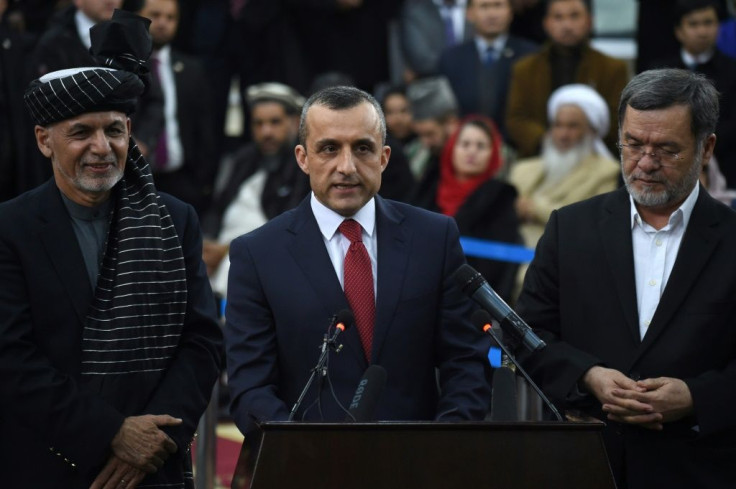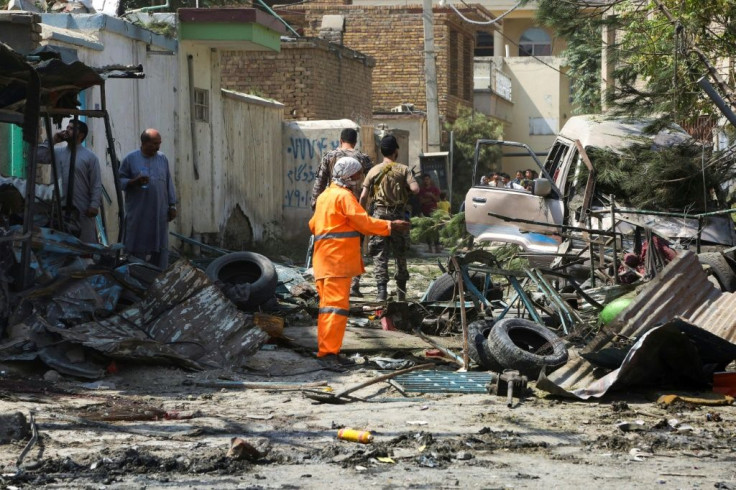Enigmatic Afghan Vice-President Saleh Vows To Keep Fighting
Few lives have personified the fortunes and perils of Afghanistan since the US-led invasion in 2001 as that of Vice President Amrullah Saleh.
Saleh on Wednesday narrowly survived the latest attempt on his life -- the second in just over a year -- after a bomb targeting his convoy killed at least 10 people in Kabul.
Within hours of the blast, Saleh appeared in a video with his left hand bandaged, vowing to fight on and apologising to those killed by the blast meant for him.
"We will continue our fight, and I am always at the service of our people," said Saleh, cutting a familiar image of defiance.
The senior of Afghanistan's two vice presidents, Saleh, 47, also survived an assassination attempt last year ahead of presidential elections.
His life has been forged by the decades of war that have engulfed Afghanistan since the late 1970s.

Orphaned young, Saleh fought alongside the famed guerilla commander Ahmed Shah Massoud in the 1990s against the Soviet-backed government in Kabul.
He later served in the mujahideen government before he was chased out of Kabul by the Taliban, who later tortured his sister in their efforts to hunt him down.
"My view of the Taliban changed forever because of what happened in 1996, and I haven't seen or heard anything to make me believe they have truly changed their ways," Saleh wrote in February in Time magazine, a day before the US and Taliban signed a withdrawal deal.
Following the September 11, 2001 attacks on the US, Saleh -- who was then fighting in the anti-Taliban resistance -- became a key contact for the CIA.
The relationship paved the way for him to take over the newly formed Afghanistan intelligence service -- the National Security Directorate (NDS) -- in 2004.
As NDS chief Saleh is believed to have built an extensive network of informants inside the insurgency and across the border in Pakistan, where Pashto-speaking agents spied on Taliban leaders, according to Steve Coll's history of the Afghan War, "Directorate S".

The intelligence Saleh collated provided what he alleged was definitive proof the Pakistani intelligence services were backing the Taliban and undermining their American allies.
Saleh's rise has not been without its share of falls.
Known for his combativeness -- and paranoia -- Saleh has rarely wavered in his outspoken hatred of the Taliban and their alleged backers in Pakistan.
In 2010, he was fired as Afghanistan's spy chief following an embarrassing attack on a Kabul peace conference.
Forced into the political wilderness, Saleh maintained his fight against the Taliban and Pakistan on his Twitter account, where he fired off daily English tweets aimed at his long-time enemies.
A return to favour came in 2018 when he briefly led the interior ministry after forging an alliance with President Ashraf Ghani.
His most recent political revival coincided with the US decision to leave Afghanistan.
As the Taliban prepare to sit for peace talks, analysts believe they are desperate to eliminate their fiercest rival.
The Taliban "are now thinking and planning to remove people who might become a headache and obstacle for them when they return", Kabul-based analyst Atta Noori said.
"One of them is Amrullah Saleh. The Taliban don't want another Massoud to fight them until the last breath," he added.
© Copyright AFP 2024. All rights reserved.





















